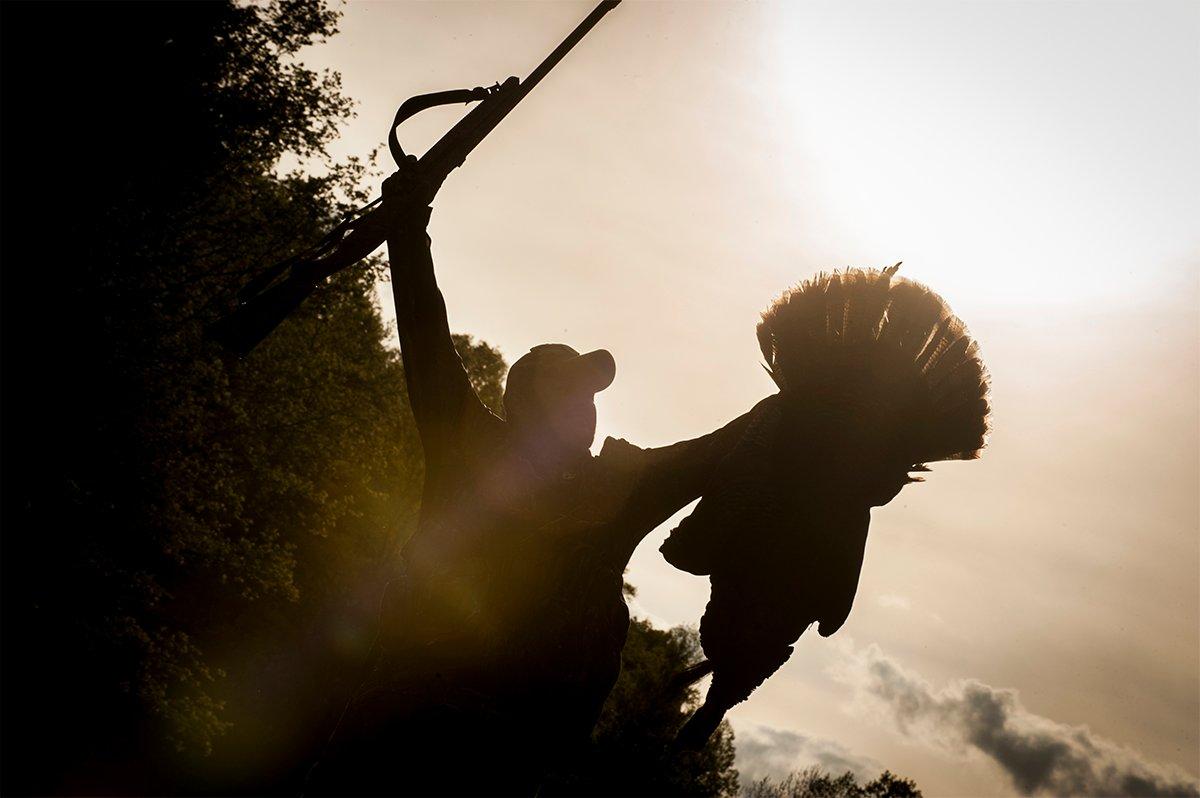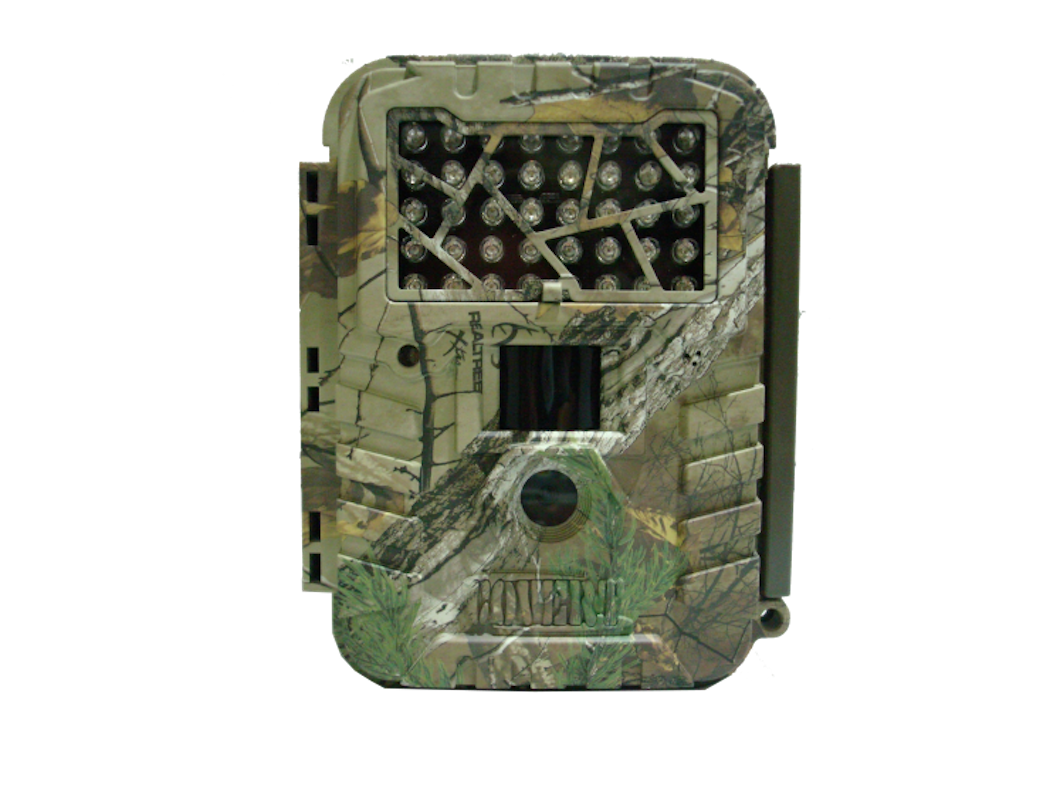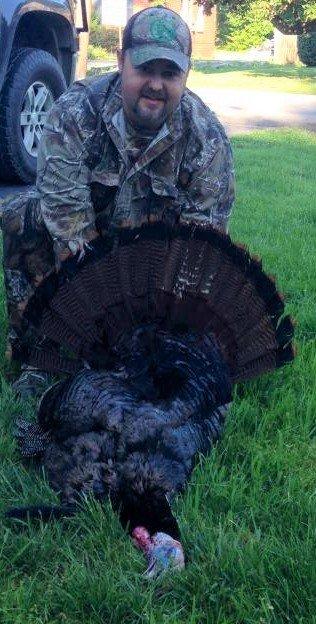Turkey Hunting Tips from Realtree Pro Staffer Daryle Singletary
Daryle Singletary doesn't consider himself a great turkey hunter, not by a long shot, but he's learned a thing or two pursuing the birds when he's not on stage belting out country songs.
I'm not the best by no means, but with trial and error I've gotten lucky, he said.
Recently, he talked turkey, keying on three considerations successful hunters should keep in mind - timing (during the day and season), location (scouting and picking the best location) and position (getting yourself into position to be successful, which means avoiding pitfalls, like natural or man-made barriers between you and the birds).
Singletary, whose CD There's Still a Little Country Left is the latest in a line of his hardcore traditional country albums, is a Realtree pro staffer, team roper and avid hunter. He has the Royal Slam of wild turkeys - all four U.S. sub-species, Eastern, Osceola, Rio Grande and Merriam's, and a Gould's from Mexico. An ocellated turkey from Central America or Mexico would complete the World Slam, but he has no plans to pursue it.
Singletary takes advantage of opportunities to hunt while on tour, but his favorite hunting place is close to his Tennessee home, 700 acres of farmland and undeveloped woodland, with a creek flowing through it, owned by family friends who invite him on their property. He intersperses blessed and fortunate in conversations about his hunting and musical opportunities.
On a hunt in 2001, Singletary had missed two or three turkeys on film with his double-barreled shotgun. The next day, with cameras rolling, singer Rhett Akins called him Double-Barrel Daryle, a nickname that stuck.
1. Timing
Most of Singletary's hunting is during the week, his weekends booked for shows. As his schedule allows, he hunts any time of the season, early, middle or late. He's got a late-season story that illustrates each of the timing, location and position points. And though he's had success with mid-morning hunts, his favorite time to be in the woods is early in the morning.
I've had most of my success at first light, he said. But if you can get a bird that's really working mid-morning, if you can get a bird to gobble, any turkey hunter will tell you it's probably killable, but I definitely enjoy first-light hunting.
I love it, that's probably my favorite part, he said, hearing the woods come alive and hearing everything wake up and you're sitting there, set up in a spot with birds and he goes to hammerin', it's just cold shivers down your back. There's nothing like that.
2. Location
Singletary often hunts with a friend, a member of the landowner's family, and the two of them fill and maintain feeders (which are emptied and unused well before season, as required by law), monitor game cameras and keep an eye on turkeys and their movements.
Covert Scouting Cameras Night Stryker in Realtree Xtra
He and I keep feeders up and keep a running tab on what's going on, Singletary said. We talk about once or twice a week, just talking turkeys. We normally talk the night before we go out and one of us usually has been out to look for birds and listen for birds and usually knows where they are.
The turkeys roost in hardwoods along the creek and the surrounding agricultural land tends to provide plenty of food, so the turkeys don't feel the need to wander far, Singletary said. If you don't pressure birds, you don't have an issue of them trying to move away, he said.
Scouting can pay off. Toward the end of last season, Singletary had gotten to know two gobblers in particular fairly well. I could set my watch on where they would be and what time they would be there, he said. It never failed.
At about 3 to 3:30 in the afternoon, the gobblers would be strutting in a gap between two fields, he said. Though he did not kill either gobbler, one encounter he had was memorable. One afternoon, he was out with his twin sons, Mercer and Jonah, then 5. (He and his wife, Holly, also have two daughters, Nora Caroline, 4, and Charlotte, 2.) He was planning to take the boys to a blind. I wasn't really thinking I would hunt, he said. I just wanted them to experience it.
Singletary spotted the two gobblers in their strut zone and parked, and telling the boys to stay with the UTV he grabbed his Thunder Chicken decoy and sneaked to a thick fenceline. He set up the decoy and yelped a couple times and one of the gobblers looked up. He wasn't alert or anything and didn't do anything, he said, Then all the sudden he just busted out of the field and I'm like 'What in the world did he see?' and I turn around and four little feet were coming up behind me. The boys wanted to see what was going on and didn't want to sit in that buggy. Singletary laughed it off and they spent time in the blind, listening to gobbling as turkeys went to roost. They got a kick out of that, he said.
3. Position
Knowing the lay of the land, especially location of natural barriers, like a creek or ravines, and manmade barriers, like fences, will help you learn where to set up so barriers don't interfere.
I sure don't claim to know it all but I've hunted them long enough that I realize sometimes my calling is not good enough to get them to do what I want them to do and setting up differently can be the key, Singletary said.
And that brings him to his story. It was late in the season and he and his buddy had been hunting several days and would get close, including the time Singletary crawled out in the field after five strutters. He ended up backing out when his buddy suggested they try a different approach, which didn't work. They bumped the birds and were done for the day. That was the last day his buddy could hunt but he suggested Singletary try again the next day.
We had hunted three mornings and we set up on the wrong side. They were coming down between us and the creek but they just hung up, he said. I mean they would not move. So I thought all night about it, as most turkey hunters do, about where can I get where these birds are going to be on top of me.
This was back six or so years, when Singletary had just started hunting the property. He didn't know the property well, but he knew he'd need to cross some fences and go some places I'd never been, he said.
He pulled it off, sneaking in from a different direction and set up on the fenceline that seemed to be causing the birds to hang up. As daylight neared, hens pitched down to the field in front of him, then everything started waking up, he said. Probably six, eight gobblers were just wearing it out and flew down just like they had the other mornings.
The fencerow where he sat was thick with brush and weeds, so thick he couldn't see all that was going on in the field in front of him. He tells it from there: Me, being a little impatient, I just stood up with that Thunder Chicken and this bird saw me and was just on his way. He was coming in to whup on that Thunder Chicken and I sat down and had that decoy between my legs and my shotgun resting on my legs when a hen walked by so close if it had been on my side of the fence it would have walked over my feet. I think I'm busted but she just walks by. Then out of my peripheral vision I see a big red head coming through the thick stuff and unbeknownst to me there's a hole in the fence and he comes all the way over to my side of the fence and now I'm in a position where I got to do something or this bird is fixin' to come in and whip me and this Thunder Chicken.
"With trial and error I've gotten lucky.
- Daryle Singletary
Now holding the decoy in front of him, Singletary managed to scoot around in position and raise his shotgun. This bird comes in so focused on that decoy and he never slows up. He gets to within 10 or 15 steps and I just drop the Thunder Chicken and kill that turkey, he said. After his pounding heart slowed a bit, he collected his thoughts. And I'm thinking there's no footage, I've got nothing but a picture when the bird's dead and no one will ever believe that happened to me, but it was one of the neatest deals.
Singletary figures he started turkey hunting in about the year 2000, and it's just been crazy since, he said. To this day when I hear a turkey gobble, even if I hear them gobble on TV, I get excited.
And in all that excitement, sometimes timing, location and position all come together and another hunting memory is made.
Go here for more Realtree turkey hunting. Follow us on Facebook.
Editor's note: Daryle Singletary passed away on February 12, 2018. Read more about him in our post here.









